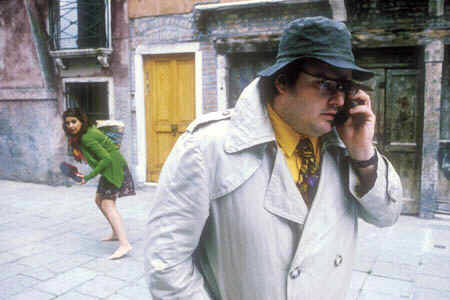Bread and Tulips
(Pane e Tulipani)


For a movie that essentially swept the 2000 Donatello Awards (the Italian equivalent of the Academy Awards), Bread and Tulips is a remarkably light piece of work. One expects more from a film that won nine awards, including best film, director, actor, actress, supporting actor, supporting actress, screenplay, and cinematography. Bread and Tulips is merely a fluffy comedy about a woman regaining her sense of adventure and independence, the type of movie that leaves a happy, ephemeral feeling. The woman in question is Rosalba (Licia Maglietta, Nasty Love, RDF), a harried housewife. She lives to serve her family, mistaking her busyness for happiness. Worse, her family does not appreciate her. While on vacation, she goes to the bathroom, and leaves only to find that her family left, forgetting to take her with them.
Rosalba immediately goes about going home. However, there is a small desire in her to see Venice, one that eventually overpowers her desire to return home. Her newfound freedom is exhilarating, and she resolves to head off towards Venice, with only a postcard to her family (who seem more annoyed than worried). Her husband hires Costantino (Guiseppe Battiston, A Split Soul, Ask Me If I'm Happy), a plumber and wannabe private detective to track down Rosalba and bring her home. In the meantime, Rosalba has a job in a flower shop, is renting a room from Fernando (Bruno Ganz, Who Afraid Wolf, You Can't Go Home Again), a charming older gentleman, and made friends with her neighbor Grazia (Marina Massironi, Ask Me If I'm Happy, Not of This World).
Bread and Tulips switches from slapstick comedy with Costantino and a gentle movie of Rosalba's awakening sense of freedom. Director Silvio Soldini (Rom Tour, Le Acrobate). Costantino is a bumbling detective, with a constantly ringing cell phone. Soldini and co-writer Doriana Leondeff (Notes of Love, Le Acrobate) write his character as if he couldn't find his way out of a room. The methods he uses to locate Rosalba are surprisingly effective, yet bizarre. He even feels the need to don the trench coat and hat; perhaps he will be a better detective if he looks the part.
Maglietta does give a good performance. As Rosalba, she takes small, hesitant steps forward. Freedom is new to her, especially after so many years of suffering in her family. Away from her family, she finds that she is happy. Still, she deeply loves her husband, but is no longer in love with him. With each new experience, she becomes bolder, trying new things and becoming surer of herself. This is the heart of the movie. Fernando is much the same way. He is comfortable in his life, taking hesitant steps towards his new friend. 'Nice' is probably the best word to describe Bread and Tulips. Nothing particularly spectacular, but nothing bad either.